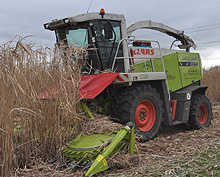Agronomy firm targets renewables

Improving all aspects of energy crop production and use is the aim of a network of demonstration units unveiled by Masstock at Cereals 2011.
Three initial “Energy Smart Farms” have been set up to trial a range of energy crops, such as short rotation coppice, miscanthus, combinable crop straws, maize and grass silages, plus less obvious options like sorghum and eucalyptus.
One of the farms is a 28ha (70-acre) site adjacent to Drax power station, announced earlier in the spring. This has been joined by the home farm of miscanthus specialists, International Energy Crops, near Market Drayton in Shropshire and two neighbouring 280ha (700-acre) mixed farms in the Cotswolds that have self-built an anaerobic digestion unit.
“The emphasis throughout will be on cutting through complexity and confusion to provide the most practical and profitable guidance on land selection, crop and variety choice, agronomy, marketing and on-farm utilisation, in particular,” Masstock business development manager, David Neale, said. “We’ll also look at how energy crops can fit with schemes such as the Entry Level Stewardship.
“With Feed-in Tariffs, Renewable Heat Incentives and other opportunities, farm energy in the UK is at a hugely exciting but rapidly changing stage in its development. What farmers need more than anything is reliable information and advice on the practicality of the opportunities available and how best to integrate them with existing enterprises for greatest value and least risk.”
Pellets cut cost of hauling miscanthus
A new pelleting plant for miscanthus straw could soon allow more growers in Shropshire to supply biomass to Drax power station in Yorkshire.
The 20,000t capacity plant, being built by IEC owner Wilson Farming and contracted directly to Drax, will improve the viability of road hauling miscanthus straw across the country, IEC managing director Keith Wilson said. “You can normally get 22t of miscanthus straw on a lorry as bales, but this can be increased to 29t by pelleting it, saving about £12/t on haulage.”
Mr Wilson said around 18,000t of miscanthus was grown across the West Midlands, for both Drax and Ely power stations. “We’ll be mainly taking crops from a 25-mile radius of the pelleting plant and hopefully encourage a few more growers within that local area.” The pelleting plant is due to open next year.
